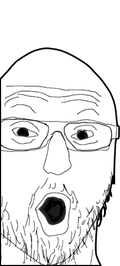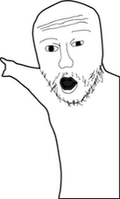WHERE TO GET THE BOOK: http://libgen.is/book/index.php?md5=F6B31A8DAFD6BD39A5986833E66293E6
Audiobook format (expires 1/27): https://litter.catbox.moe/l3298q.m4b
So, this post will be "Introduction" in the sense that it will introduce us all to the book club and the book, and we will also be covering the introduction. The emotional content is pretty heavy; as such I figured it deserved its own discussion. It's not especially long, but it covers Dr. Price's journey into accepting his autism, and if you're on the spectrum or even just neurodivergent in general you'll probably strongly relate to a lot of what he lays down here. You, like me, may read this chapter and find yourself thinking he's literally me, he just like me, he just like me fr ong no cap 
Dr. Price is a transgender social psychologist born in Ohio, who graduated from Loyola University Chicago where he teaches as a professor in continuing studies. He wrote and published Laziness Does Not Exist before this one, and it's also worth a read. In this book, Dr. Price also discusses his gender identity and how there's a very high incidence of gender non-conformity amongst neurodiverse people. So in addition to folks with ADHD and autism, or those with other neurodiversities, it can also benefit LGBT+ folks who have to cover up their true selves for safety or social acceptance.
I plan on making another post about chapter one on Sunday or Monday of next week, depending on whether I can make time, and then one post about each chapter every week or every other week depending on what people's feedback is.
In the intro, Dr. Price discusses his personal and emotional problems, social isolation, autistic self-discovery and research, entry into the autism self-advocacy community, and official diagnosis. He discusses how people who don't fit the stereotype of autism are often neglected by medical professionals. How this neglect harms neurodiverse people of all stripes, and how unmasking can be a key to a full, authentic life. (Here's hoping.)
He describes unmasking as a frightning and, indeed, potentially dangerous prospect, but provides tools throughout for approaching the process and beginning to know yourself, find where the mask ends and you begin, and believe that the person underneath is worth knowing in the first place.
First, discussion questions:
- What interested you in this book club?
- Are you neurodiverse? Do you know someone who is?
- What stood out to you about the introduction? Any choice quotes? Anything you relate to?
He ends with an exercise called the Values-Based Integration Process, which we'll go over below.
VALUES-BASED INTEGRATION PROCESS (by Heather R Morgan) STEP ONE
"Think of five moments in your life where you felt like you were FULLY ALIVE. Try to find moments throughout your life (childhood, adolescence, adulthood, school, work, vacation, hobbies)
Some of the moments might leave you with a sense of awe and wonder -- 'Wow, if all of life was like that, it would be amazing!'
Some of the moments might leave you feeling deeply recharged and ready to face the next challenge, or satisfied and fulfilled."
The books says to write it down in as much detail as possible, but I don't actually expect anyone to post all that stuff here. Just a personal exercise to get the juices flowing. I'll post some of my own personal thoughts in a comment below.
[email protected] , I was asked to tag you for a sticky on this. I think a few mods are in my tag list as well if you can't get to it.
The following folks asked to be tagged:
- [email protected]
- [email protected]
- [email protected]
- [email protected]
- [email protected]
- [email protected]
- [email protected]
- [email protected]
- [email protected]
- [email protected]
- [email protected]
- [email protected]
- [email protected]
- [email protected]
- [email protected]
- [email protected]
- [email protected]
- [email protected]
- [email protected]
- [email protected]
- [email protected]



 reactions to the contents of this intro, and even I had a hard time re-reading it, so I figured I'd give everyone a chance to get acquainted with what's in store before they strap in for the unexpected emotional roller coaster this book can be if you're neurodivergent or even just love someone who is. As the book explores, autism is poorly understood even among the medical community. That's not hard to understand when you look at the diagnostic criteria and the list of symptoms are like "poor eye contact" "monotone voice" "bad social skills" "what is this fucking guy's problem" "get a load of this fucking dork" "I'm annoyed, medically, as a doctor" etc. rather than focusing on the internal experience of what it's like to be autistic.
reactions to the contents of this intro, and even I had a hard time re-reading it, so I figured I'd give everyone a chance to get acquainted with what's in store before they strap in for the unexpected emotional roller coaster this book can be if you're neurodivergent or even just love someone who is. As the book explores, autism is poorly understood even among the medical community. That's not hard to understand when you look at the diagnostic criteria and the list of symptoms are like "poor eye contact" "monotone voice" "bad social skills" "what is this fucking guy's problem" "get a load of this fucking dork" "I'm annoyed, medically, as a doctor" etc. rather than focusing on the internal experience of what it's like to be autistic. 



 ] goes) was the RAADS-R. The threshold for "autistic as fuck" is 160, I got a 165 on it. So, yeah, probably. Won't change much in how I treat it with regards to therapy and whatnot, but in terms of how I understand and interpret myself and my needs? Groundbreaking. Very much needed.
] goes) was the RAADS-R. The threshold for "autistic as fuck" is 160, I got a 165 on it. So, yeah, probably. Won't change much in how I treat it with regards to therapy and whatnot, but in terms of how I understand and interpret myself and my needs? Groundbreaking. Very much needed.